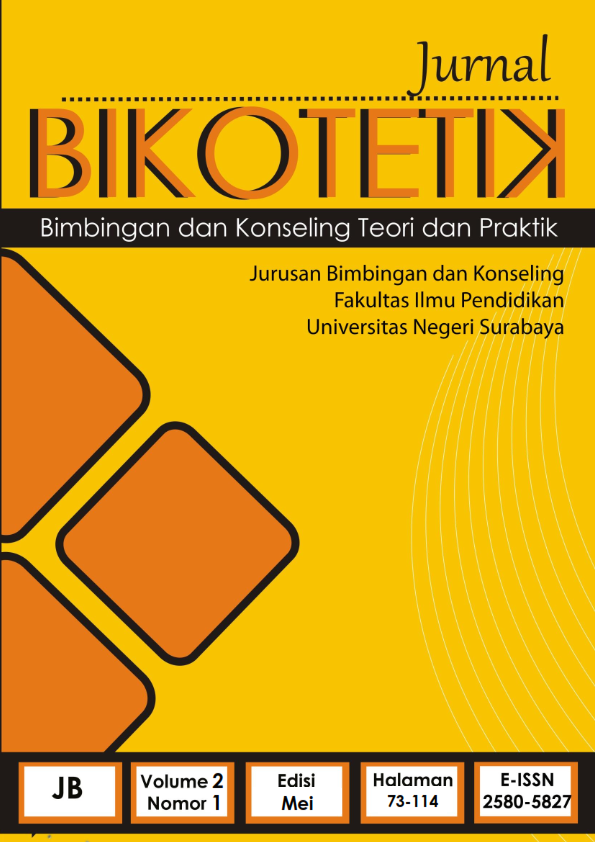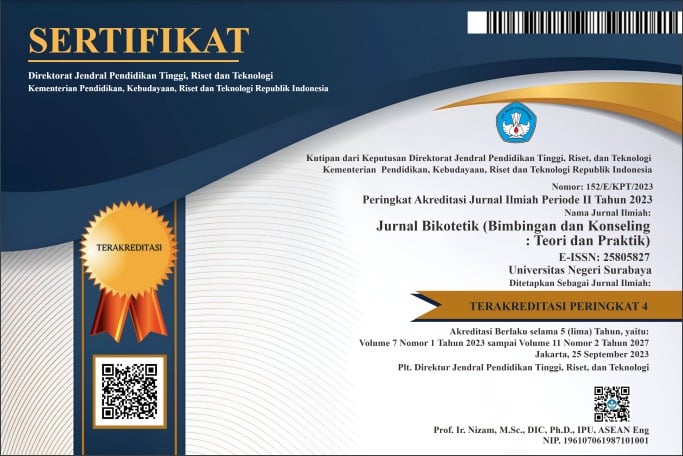Penerapan Solution-Focused Brief Counseling (SFBC) untuk Meningkatkan Konsep Diri Akademik Siswa
DOI:
https://doi.org/10.26740/bikotetik.v2n1.p93-99Keywords:
konsep diri akademik, pendekatan Solution-Focused Brief Counseling (SFBC)Abstract
Konsep diri akademik menjadi salah satu pemeran penting dalam pembentukan identitas diri siswa untuk mencapai keberhasilan dalam bidang akademik. Beberapa kasus siswa membolos hingga berhenti sekolah dengan alasan tidak menyukai mata pelajaran tertentu ditengarai akibat kurangnya pemahaman para siswa mengenai konsep diri akademik mereka sendiri, sehingga hal ini dapat menimbulkan menurunnya hasil belajar hingga kegagalan pada siswa. Bimbingan dan konseling sebagai komponen pendidikan disekolah sesungguhnya dapat mengambil peranan dalam membantu siswa meningkatkan konsep diri akademik. Salah satu kegiatan layanan bimbingan dan konseling yang dapat dilaksanakan adalah kegiatan konseling individu. Tentu untuk mencapai hasil yang maksimal dibutuhkan teknik atau pendekatan khusus. Adapun pendekatan yang dapat digunakan adalah pendekatan Solution-Focused Brief Counseling (SFBC), melalui pendekatan ini siswa akan berkolaborasi dengan konselor untuk berfokus menemukan solusi sehingga bisa melakukan perubahan pada diri menjadi individu yang memiliki konsep diri positif. Pendekatan berfokus pada pembangunan solusi sehingga dengan solusi yang ditemukan, siswa bisa secara singkat untuk membantu penyelesaian tugas perkembangannya.References
Budiarsih, Anita Putri dan Ella Faridati Zen. 2016. Studi Kasus Konsep Diri Akademik Siswa Sekolah Dasar. Jurnal Kajian Bimbingan dan Konseling 1 (3) : 112-117.
Bannink, F. P. 2007. Solution-Focused Brief Therapy. J Contemp Psychother, 37, 87-94.
Cokley, Kevin. 2000. An Investigation of Academic Self-Concept and Its Relationship to Academic Achievement in African American College Students. Journal of Black Psychology, 26 (2), 148-164.
Connie, Elliott dan Linda Metcalf. 2009. The art of Solution Focused Therapy. New York : Springer Publishing Company.
Corey, Gerald. 2013. Theory adn Practice Counseling and Psychotherapy (9th edition). Belmont, CA: Brooks/Cole.
Dagnew, Asrat. 2015. The Relationship among Parenting Styles, Academic Self-concept, Academic Motivation and Student˜ Academic Achievement in Fasilo Secondary School: Bahir Dar, Ethiopia. Science, Technology and Arts Research Journal , 4(3): 215-221.
Feist, Jess dan Gregory J. Feist. 2013. Teori Kepribadian (Theories of Personality). Terjemakan Handriatno. Edisi 7. Jakarta : Salemba Humanika
Flowers, Lawrence O, James E. Raynor, Jr, dan Erin N. White. 2013. Investigation of Academic Self-Concept of Undergraduates in STEM Courses. Journal of Studies in Social Sciences , 5 : 1-11.
Franklin, Cynthia, Kelly Moore, and Laura Hopson. 2008. Effectiveness of Solution-Focused Brief Therapy in a School Setting. Children & Schools, 30(1) : 15-26.
Glading, Samuel T. 2015. Konseling Profesi yang Menyeluruh (Terjemahan Winarno) (Ed. Keenam). Jakarta : PT. Indeks.
Gudnanto, Anwar Sutoyo, dan Maman Rahman. 2013. Pengembangan Model BK Kelompok Berbasis Islami untuk Peningkatan Konsep Diri. Jurnal Bimbingan dan Konseling, 2(1) : 19-24.
Hardy, Graham. 2013. Academic Self-Concept: Modeling and Measuring for Science. Research in Science Education is the property of Springer Science & Business Media Dordrecht. 44:549579.
Hurlock, Elizabeth B. 2003. Psikologi Perkembangan : Suatu Pendekatan Sepanjang Rentang Kehidupan (Edisi Kelima). Terjemahan. Jakarta : Erlangga
Isikal, Mine. 2010. A Comparative Study on Undergraduate StudentsAcademic Motivation and Academic Self-Concept. The Spanish Journal of Psychology 13(2), 572-585.
Kelly, Michael S, Johnny S. Kim, and Cynthia Franklin. 2008. Solution-Focused Brief Therapy in Schools. New York : Oxford University Press
Mandelman, S.D, Mey Tan, S. A Kornilov, R. J Sternberg, & E. L Grigorenko. 2010. The Metacognitive Component of Academic Self-Concept: The Development of a Triarchic Self-Scale. Journal of Cognitive Education and Psychology, 9(1) : 73-86.
Manik, Resmin, Carolina L. Radjah, & Triyono. 2017. Rendahnya Konsep Diri Akademik Siswa SMP. Jurnal Pendidikan: Teori, Penelitian, dan Pengembangan. 2 (4) : 494-502.
Mulawarman. 2014. Brief Counseling in Schools: a Solution-Focused Brief Counseling (SFBC) Approach for School Counselor in Indonesia. Journal of Education and Practice, 5(21) : 68-72.
Marsh, H.W. 2003. A Reciprocal Effects Model of the Causal Ordering of Academic Self-Concept and Achievement. Paper presented at NZARE AARE. Auckland, New Zealand.
Palmer, Stephen (Ed). 2011. Konseling dan Psikoterapi (Terjemahan Haris). Yogyakarta : Pustaka Pelajar
Saifullah. 2015. Hubungan Konsep Diri Akademik Dengan Prestasi Akademik. Jurnal Lisan Al-Hal, 7(2) : 249-258.
Samiroh, dan Zidni Imawan Muslimin. 2015. Hubungan Antara Konsep Diri Akademik Dan Perilaku Menyontek Pada Siswa- Siswi Mas Simbangkulon Buaran Pekalongan. Jurnal Psikologi Islam, 1 (2) : 67-77.
Sobhy, M., & Cavallaro, M. 2010. Solution-focused brief counseling in schools: Theoretical perspectives and case application to an elementary school student. http://counselingoutfitters.com/vistas/vistas10/Article_81.pdf.
Bannink, F. P. 2007. Solution-Focused Brief Therapy. J Contemp Psychother, 37, 87-94.
Cokley, Kevin. 2000. An Investigation of Academic Self-Concept and Its Relationship to Academic Achievement in African American College Students. Journal of Black Psychology, 26 (2), 148-164.
Connie, Elliott dan Linda Metcalf. 2009. The art of Solution Focused Therapy. New York : Springer Publishing Company.
Corey, Gerald. 2013. Theory adn Practice Counseling and Psychotherapy (9th edition). Belmont, CA: Brooks/Cole.
Dagnew, Asrat. 2015. The Relationship among Parenting Styles, Academic Self-concept, Academic Motivation and Student˜ Academic Achievement in Fasilo Secondary School: Bahir Dar, Ethiopia. Science, Technology and Arts Research Journal , 4(3): 215-221.
Feist, Jess dan Gregory J. Feist. 2013. Teori Kepribadian (Theories of Personality). Terjemakan Handriatno. Edisi 7. Jakarta : Salemba Humanika
Flowers, Lawrence O, James E. Raynor, Jr, dan Erin N. White. 2013. Investigation of Academic Self-Concept of Undergraduates in STEM Courses. Journal of Studies in Social Sciences , 5 : 1-11.
Franklin, Cynthia, Kelly Moore, and Laura Hopson. 2008. Effectiveness of Solution-Focused Brief Therapy in a School Setting. Children & Schools, 30(1) : 15-26.
Glading, Samuel T. 2015. Konseling Profesi yang Menyeluruh (Terjemahan Winarno) (Ed. Keenam). Jakarta : PT. Indeks.
Gudnanto, Anwar Sutoyo, dan Maman Rahman. 2013. Pengembangan Model BK Kelompok Berbasis Islami untuk Peningkatan Konsep Diri. Jurnal Bimbingan dan Konseling, 2(1) : 19-24.
Hardy, Graham. 2013. Academic Self-Concept: Modeling and Measuring for Science. Research in Science Education is the property of Springer Science & Business Media Dordrecht. 44:549579.
Hurlock, Elizabeth B. 2003. Psikologi Perkembangan : Suatu Pendekatan Sepanjang Rentang Kehidupan (Edisi Kelima). Terjemahan. Jakarta : Erlangga
Isikal, Mine. 2010. A Comparative Study on Undergraduate StudentsAcademic Motivation and Academic Self-Concept. The Spanish Journal of Psychology 13(2), 572-585.
Kelly, Michael S, Johnny S. Kim, and Cynthia Franklin. 2008. Solution-Focused Brief Therapy in Schools. New York : Oxford University Press
Mandelman, S.D, Mey Tan, S. A Kornilov, R. J Sternberg, & E. L Grigorenko. 2010. The Metacognitive Component of Academic Self-Concept: The Development of a Triarchic Self-Scale. Journal of Cognitive Education and Psychology, 9(1) : 73-86.
Manik, Resmin, Carolina L. Radjah, & Triyono. 2017. Rendahnya Konsep Diri Akademik Siswa SMP. Jurnal Pendidikan: Teori, Penelitian, dan Pengembangan. 2 (4) : 494-502.
Mulawarman. 2014. Brief Counseling in Schools: a Solution-Focused Brief Counseling (SFBC) Approach for School Counselor in Indonesia. Journal of Education and Practice, 5(21) : 68-72.
Marsh, H.W. 2003. A Reciprocal Effects Model of the Causal Ordering of Academic Self-Concept and Achievement. Paper presented at NZARE AARE. Auckland, New Zealand.
Palmer, Stephen (Ed). 2011. Konseling dan Psikoterapi (Terjemahan Haris). Yogyakarta : Pustaka Pelajar
Saifullah. 2015. Hubungan Konsep Diri Akademik Dengan Prestasi Akademik. Jurnal Lisan Al-Hal, 7(2) : 249-258.
Samiroh, dan Zidni Imawan Muslimin. 2015. Hubungan Antara Konsep Diri Akademik Dan Perilaku Menyontek Pada Siswa- Siswi Mas Simbangkulon Buaran Pekalongan. Jurnal Psikologi Islam, 1 (2) : 67-77.
Sobhy, M., & Cavallaro, M. 2010. Solution-focused brief counseling in schools: Theoretical perspectives and case application to an elementary school student. http://counselingoutfitters.com/vistas/vistas10/Article_81.pdf.
Downloads
Published
2018-05-22
How to Cite
Nugroho, A. H., Puspita, D. A., & Mulawarman, M. (2018). Penerapan Solution-Focused Brief Counseling (SFBC) untuk Meningkatkan Konsep Diri Akademik Siswa. Jurnal Bikotetik (Bimbingan Dan Konseling: Teori Dan Praktik), 2(1), 93–99. https://doi.org/10.26740/bikotetik.v2n1.p93-99
Issue
Section
Articles
 Abstract views: 6773
,
Abstract views: 6773
, PDF Downloads: 21206
PDF Downloads: 21206










